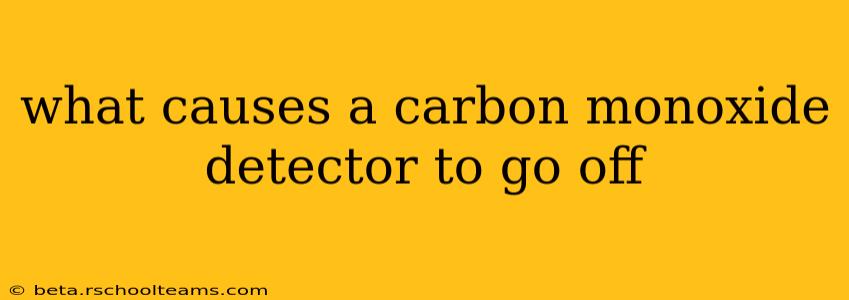A carbon monoxide (CO) detector going off is a serious event demanding immediate action. Understanding the potential causes can help you prevent future incidents and ensure your safety. While a malfunctioning detector is possible, most alarms are triggered by the presence of dangerous levels of carbon monoxide in your home. Let's explore the common culprits.
What are the main reasons a carbon monoxide detector goes off?
The primary reason a CO detector sounds its alarm is the presence of carbon monoxide gas in the air exceeding safe levels. This colorless, odorless gas is a byproduct of incomplete combustion of fuels like natural gas, propane, oil, wood, and charcoal. Several appliances and systems can contribute to CO buildup:
- Faulty Furnaces: A malfunctioning furnace, particularly one with a cracked heat exchanger, is a leading cause. Cracks allow combustion byproducts, including CO, to leak into your living space.
- Gas Water Heaters: Similar to furnaces, problems with the water heater's burner or heat exchanger can release dangerous levels of CO.
- Gas Stoves and Ovens: Improperly vented or malfunctioning gas stoves and ovens can also emit CO. Ensure proper ventilation when using these appliances.
- Gas Fireplaces: Gas fireplaces, if not properly maintained and vented, can be a source of CO leakage.
- Cars and Other Vehicles: Running a car or other vehicles in an attached garage, even with the door slightly open, can quickly lead to CO buildup in your home.
- Generators: Using generators near your home, especially in enclosed spaces or without proper ventilation, presents a significant CO hazard.
- Other Appliances: Other appliances that burn fuel, such as kerosene heaters or portable generators, can also contribute to CO poisoning if not used and maintained correctly.
Can a faulty carbon monoxide detector go off?
Yes, although less common than actual CO presence, a faulty CO detector can trigger a false alarm. This can happen due to:
- Low Battery: A simple low battery warning can sound like a full-blown alarm on some models. Always check your batteries regularly.
- Detector's Lifespan: CO detectors have a limited lifespan (typically 5-7 years), after which their sensors may become less reliable and might trigger false alarms. Check the manufacturer's recommendations for replacement.
- Dust and Debris: Accumulation of dust, dirt, or other debris on the detector's sensor can cause malfunctions. Regularly clean the detector according to the manufacturer's instructions.
- Humidity and Temperature: Extreme temperature fluctuations or high humidity can affect the detector's performance, potentially triggering false alarms.
- Electromagnetic Interference (EMI): In rare cases, strong electromagnetic fields from nearby appliances might interfere with the detector's operation.
What should I do if my carbon monoxide detector goes off?
If your CO detector goes off, immediately evacuate your home and call your local emergency services (911 or your country's equivalent). Do not re-enter your home until emergency responders have declared it safe. Once outside, stay away from the building to avoid further exposure. After the emergency services have cleared the situation, thoroughly investigate the possible source of the CO leak.
How often should I test my carbon monoxide detector?
While most modern CO detectors have built-in test buttons, it’s recommended to regularly check your detector's functionality. Test it monthly and replace the batteries at least once a year, or as recommended by the manufacturer. Replace the entire unit every 5-7 years, regardless of its apparent functionality.
Can other things trigger a carbon monoxide alarm?
While CO is the primary cause, extremely high levels of certain other gases might potentially trigger a CO detector, though this is rare. The sensitivity and technology used in the detectors vary slightly between manufacturers. It is crucial to remember that any alarm should be treated as a serious indication to investigate and seek professional help.
By understanding the potential causes of carbon monoxide detector activation, and taking preventative measures, you can significantly reduce your risk of exposure to this deadly gas and protect your family's well-being. Remember, a functioning carbon monoxide detector is a critical component of home safety.
